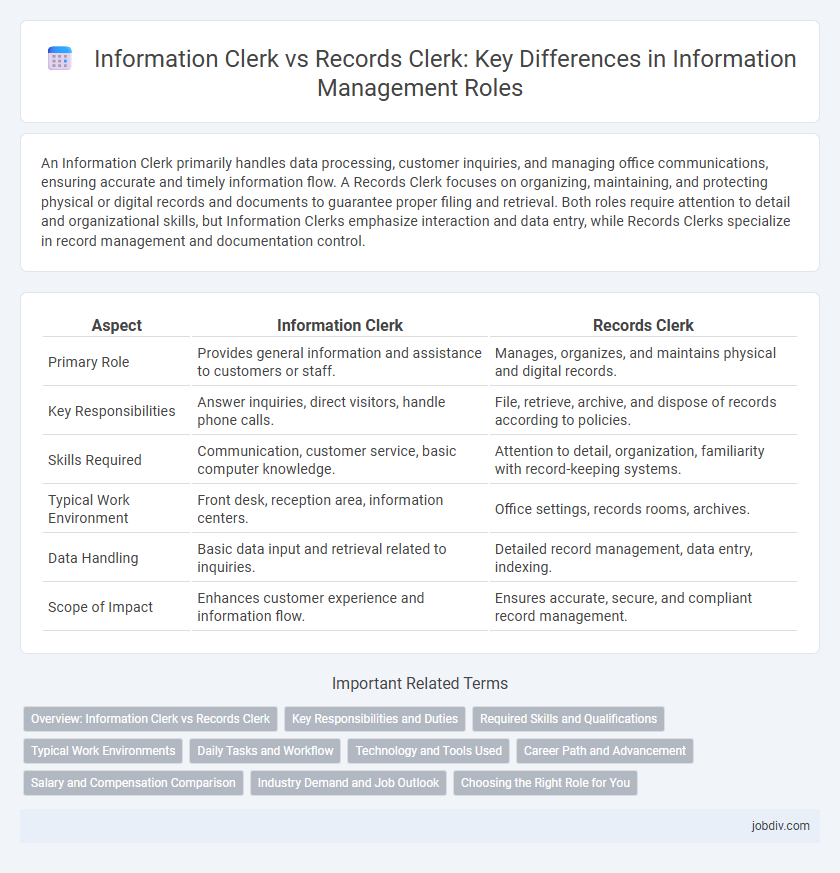An Information Clerk primarily handles data processing, customer inquiries, and managing office communications, ensuring accurate and timely information flow. A Records Clerk focuses on organizing, maintaining, and protecting physical or digital records and documents to guarantee proper filing and retrieval. Both roles require attention to detail and organizational skills, but Information Clerks emphasize interaction and data entry, while Records Clerks specialize in record management and documentation control.
Table of Comparison
| Aspect | Information Clerk | Records Clerk |
|---|---|---|
| Primary Role | Provides general information and assistance to customers or staff. | Manages, organizes, and maintains physical and digital records. |
| Key Responsibilities | Answer inquiries, direct visitors, handle phone calls. | File, retrieve, archive, and dispose of records according to policies. |
| Skills Required | Communication, customer service, basic computer knowledge. | Attention to detail, organization, familiarity with record-keeping systems. |
| Typical Work Environment | Front desk, reception area, information centers. | Office settings, records rooms, archives. |
| Data Handling | Basic data input and retrieval related to inquiries. | Detailed record management, data entry, indexing. |
| Scope of Impact | Enhances customer experience and information flow. | Ensures accurate, secure, and compliant record management. |
Overview: Information Clerk vs Records Clerk
An Information Clerk primarily manages customer inquiries, directs visitors, and handles communication tasks, focusing on providing accurate and timely information. In contrast, a Records Clerk is responsible for organizing, maintaining, and retrieving physical or electronic records, ensuring proper documentation and data integrity. Both roles support organizational efficiency but specialize in different aspects of information management and administration.
Key Responsibilities and Duties
Information Clerks manage visitor inquiries, direct individuals to appropriate departments, and maintain accurate logs of interactions to ensure efficient communication flow. Records Clerks focus on organizing, maintaining, and retrieving physical and digital files, ensuring compliance with data privacy regulations and accurate record-keeping. Both roles require attention to detail, with Information Clerks emphasizing front-line communication and Records Clerks specializing in document management.
Required Skills and Qualifications
Information Clerks require strong communication skills, proficiency in data entry, and customer service expertise to manage inquiries efficiently. Records Clerks need attention to detail, organizational skills, and familiarity with record-keeping systems or databases to accurately maintain and retrieve documents. Both roles often require basic computer literacy, knowledge of office software, and the ability to follow confidentiality protocols.
Typical Work Environments
Information clerks typically work in busy customer service areas such as office lobbies, hospitals, and government agencies where they handle inquiries and direct visitors. Records clerks are usually found in more controlled environments like corporate offices, medical facilities, and legal firms, focusing on organizing, maintaining, and retrieving data in filing rooms or archive centers. Both roles require strong attention to detail but differ in interaction levels and workspace settings.
Daily Tasks and Workflow
Information Clerks primarily manage data entry and assist with customer inquiries, focusing on organizing and retrieving information quickly to support daily operations. Records Clerks specialize in maintaining accurate filing systems, ensuring documents are properly stored, indexed, and archived for easy access during audits or reports. Both roles require strong attention to detail but differ in workflow, with Information Clerks emphasizing real-time information handling and Records Clerks concentrating on systematic record maintenance.
Technology and Tools Used
Information Clerks primarily utilize customer relationship management (CRM) software, telephone systems, and basic office productivity tools like Microsoft Office to manage and disseminate data efficiently. Records Clerks focus on specialized electronic document management systems (EDMS), database management software, and digital filing tools to organize, store, and retrieve physical and electronic records accurately. Both roles require proficiency in data entry technologies, but Records Clerks often engage with advanced archival software and compliance database platforms to ensure records integrity and regulatory adherence.
Career Path and Advancement
Information Clerks typically begin their careers handling data entry and customer inquiries, gaining skills in database management and communication that provide a foundation for advancement into administrative or office management roles. Records Clerks specialize in organizing and maintaining physical and digital records, developing expertise in records management systems that can lead to positions such as records manager or compliance officer. Both career paths offer opportunities for growth through certifications in information management, with Records Clerks often progressing into more technical or regulatory roles compared to the broader administrative trajectory of Information Clerks.
Salary and Compensation Comparison
Information clerks earn an average salary of $35,000 per year, while records clerks typically make around $33,000 annually, reflecting a modest difference in base pay. Records clerks may receive compensation benefits such as overtime pay and health insurance, comparable to those offered to information clerks, which can impact total earnings. Variations in salary depend on factors like geographic location, level of experience, and specific employer benefits within administrative and clerical roles.
Industry Demand and Job Outlook
The demand for Information Clerks is growing steadily in administrative and customer service industries due to increased data management needs, with a projected job growth rate of 5% over the next decade. Records Clerks are experiencing moderate demand, particularly in healthcare, legal, and government sectors, where precise management of physical and electronic records remains critical, showing a growth outlook of about 3%. Both roles require strong organizational skills, but Information Clerks often benefit from broader opportunities in digital information handling compared to the more specialized focus of Records Clerks.
Choosing the Right Role for You
Information Clerks primarily handle customer inquiries, data entry, and support services, making them ideal for individuals who excel in communication and multitasking. Records Clerks focus on organizing, maintaining, and retrieving physical or digital documents, suited for detail-oriented professionals with strong organizational skills. Evaluating your strengths in interpersonal interaction versus meticulous record management helps determine the best fit between these roles.
Information Clerk vs Records Clerk Infographic

 jobdiv.com
jobdiv.com